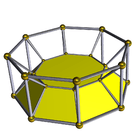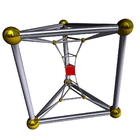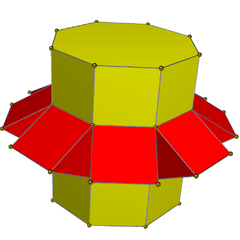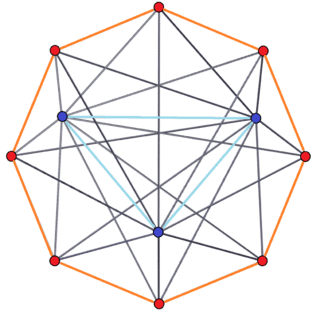3-8 duoprism
In geometry of 4 dimensions, a 3-8 duoprism, a duoprism and 4-polytope resulting from the Cartesian product of a triangle and an octagon.
Uniform 3-8 duoprisms  Schlegel diagrams | |
|---|---|
| Type | Prismatic uniform polychoron |
| Schläfli symbol | {3}×{8} {3}×t{4} |
| Coxeter diagram | |
| Cells | 3 octagonal prisms, 8 triangular prisms |
| Faces | 24 squares, 3 octagons, 8 triangles |
| Edges | 48 |
| Vertices | 24 |
| Vertex figure | Digonal disphenoid |
| Symmetry | [3,2,8], order 48 |
| Dual | 3-8 duopyramid |
| Properties | convex, vertex-uniform |
The 3-8 duoprism exists in some of the uniform 5-polytopes in the B5 family.
Images
 Net |
3-8 duopyramid
| 3-8 duopyramid | |
|---|---|
| Type | duopyramid |
| Schläfli symbol | {3}+{8} {3}+t{4} |
| Coxeter-Dynkin diagram | |
| Cells | 24 digonal disphenoids |
| Faces | 48 isosceles triangles |
| Edges | 35 (24+3+8) |
| Vertices | 11 (3+8) |
| Symmetry | [3,2,8], order 48 |
| Dual | 3-8 duoprism |
| Properties | convex, facet-transitive |
The dual of a 3-8 duoprism is called a 3-8 duopyramid. It has 24 digonal disphenoid cells, 48 isosceles triangular faces, 35 edges, and 11 vertices.

Orthogonal projection
gollark: False dichotomy.
gollark: Interesting.
gollark: The parallels to our current discussion are obvious.
gollark: Consider also the following scenario.
gollark: It's obviously named after the Ben who used to be at my school and now works at GSK.
See also
- Polytope and polychoron
- Convex regular polychoron
- Duocylinder
- Tesseract
Notes
References
- Regular Polytopes, H. S. M. Coxeter, Dover Publications, Inc., 1973, New York, p. 124.
- Coxeter, The Beauty of Geometry: Twelve Essays, Dover Publications, 1999, ISBN 0-486-40919-8 (Chapter 5: Regular Skew Polyhedra in three and four dimensions and their topological analogues)
- Coxeter, H. S. M. Regular Skew Polyhedra in Three and Four Dimensions. Proc. London Math. Soc. 43, 33–62, 1937.
- John H. Conway, Heidi Burgiel, Chaim Goodman-Strass, The Symmetries of Things 2008, ISBN 978-1-56881-220-5 (Chapter 26)
- Norman Johnson Uniform Polytopes, Manuscript (1991)
- N. W. Johnson: The Theory of Uniform Polytopes and Honeycombs, Ph.D. Dissertation, University of Toronto, 1966
- Catalogue of Convex Polychora, section 6, George Olshevsky.
External links
- The Fourth Dimension Simply Explained—describes duoprisms as "double prisms" and duocylinders as "double cylinders"
- Polygloss – glossary of higher-dimensional terms
- Exploring Hyperspace with the Geometric Product
This article is issued from Wikipedia. The text is licensed under Creative Commons - Attribution - Sharealike. Additional terms may apply for the media files.